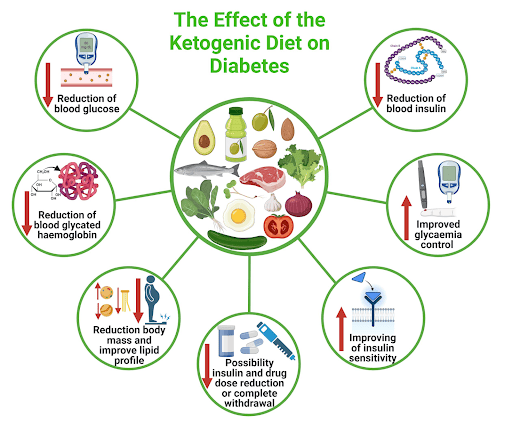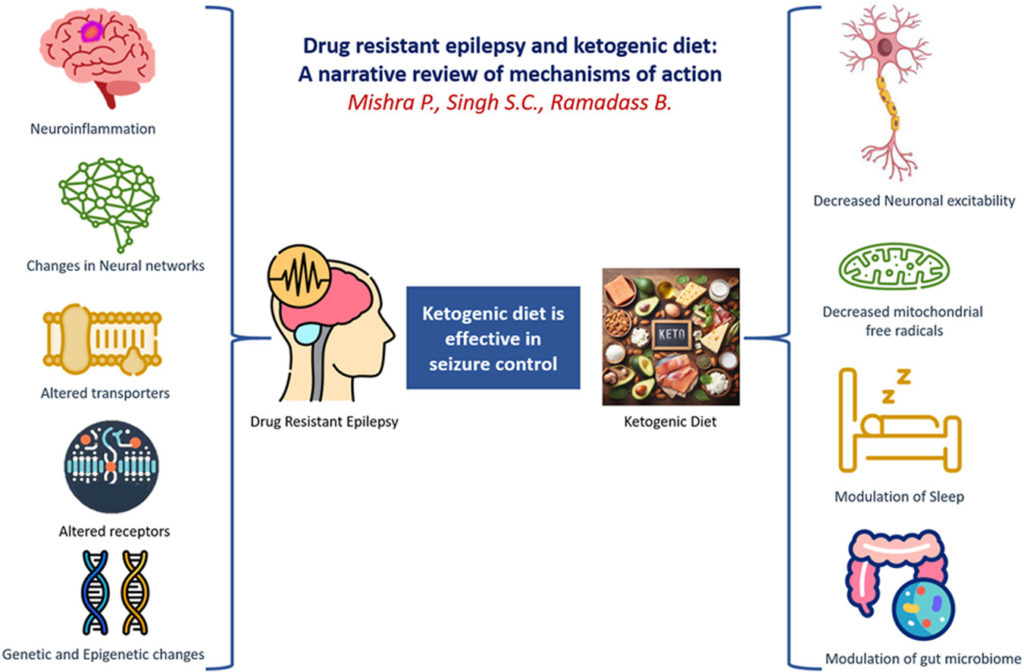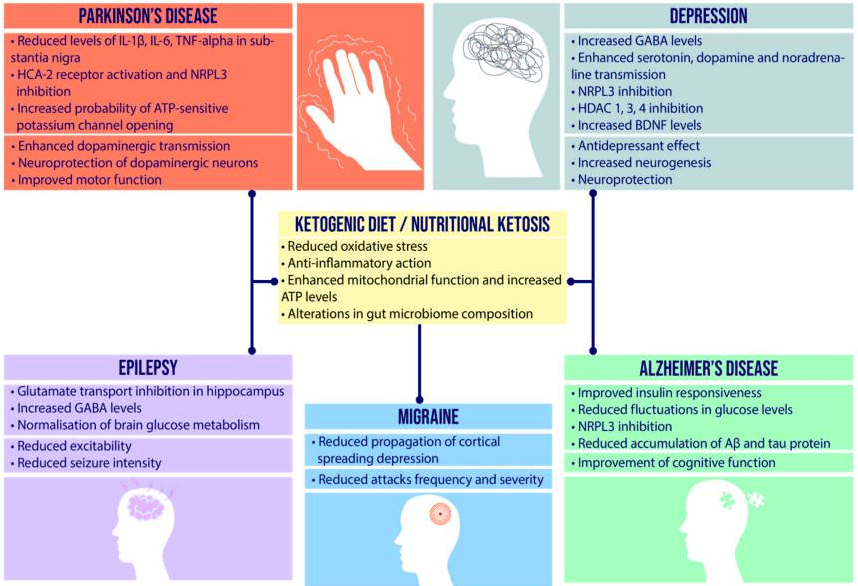
Craig Ballard
(MSc (Sports & Exercise Nutrition), BSc, BTEC (Sports & Exercise Sciences), CYQ/QCF (Personal training and Instruction))
Current studies and research show that a ketogenic diet can help assist with:
- Type 2 Diabetes
- Healthy blood sugar levels
- Epilepsy
- Alzheimer’s disease
- Dementia
- Parkinson’s disease
and other conditions, all of which we look into more detail in the article.
However, before deciding to immediately change your diet, we suggest reading the article first and checking with your doctor or nutritionist.
Health Impacts and Medical Applications
It is not only a matter of carbohydrate restriction on a ketogenic diet, but also the quality of food consumed. Low carbohydrate dietary patterns that replaced energy from carbohydrate with energy from animal-derived protein or fat, have been associated with greater mortality risk.[1]
However, this association was reversed when energy from carbohydrate was replaced with plant-derived protein or fat.[2]
This may be due to the association of saturated fat and low carbohydrate diets. Saturated fat has been observed to have a potentially negative to neutral effect on all-cause mortality, depending largely on the source and amount consumed.
In contrast, monounsaturated and polyunsaturated fats, typically associated with higher amounts in plant-based fat sources, have generally demonstrated neutral to positive effects on mortality rates.[3,4]
RELATED — Types of Fats: Healthy and Unhealthy Dietary Fats
That being said, a high mortality risk was also associated with dietary patterns with a very high carbohydrate intake over the course of a 30 year span.[1]
High mortality risk is associated with a very high carbohydrate intake
As with most evidence on diet and lifestyle, avoiding extremes is likely to reduce long-term impacts on lifespan and healthspan. Maintaining a diverse diet with a variety of foods from different sources is probably the best approach for optimal health.
However, context and individual circumstances should be considered when choosing a dietary approach.
Managing Type 2 Diabetes
Role of the ketogenic diet in regulating blood sugar levels
Severely limiting daily carbohydrate intake results in decreased absorption of monosaccharides i.e. simple carbohydrates ‘sugars’, leading to reduced blood glucose levels and minimised fluctuations, resulting in a positive regulation of glucose metabolism.[5,6]
HbA1c serves as a vital marker in diabetes management
HbA1c gauges the percentage of haemoglobin bonded with glucose which reflects average blood sugar levels over the preceding 2-3 months.
Obese and overweight individuals with type 2 diabetes mellitus (T2DM) were more likely to experience a notable reduction in HbA1c levels with the adoption of a ketogenic diet compared to those adhering to different dietary approaches.[6]
However, reductions in HbA1c achieved with carbohydrate-restricted diets typically diminish after six months on average, resulting in no further benefit on HbA1c levels.
Individuals may experience remission of diabetes without adverse consequences however, the magnitude of effect will be dependent on the individual, largely affected by the severity and management of their condition.
It has been observed that such diets are not more effective than other dietary approaches that simulate weight loss over the long term. Any benefits in HbA1c levels will likely remain as long as current body weight is maintained or patients continue to reduce body weight further.[7]
This effect seems to depend on the reduction of fat mass in participants. Consequently, the diminishing results might be due to a lack of further body fat reduction. A plateau in benefits is often seen in type two diabetes patients after reaching 5-15 percent of total body weight loss.[8,9,10]
Support for diabetes management
The ketogenic diet approach has been shown to significantly improve
- glycemic profiles
- alleviate insulin resistance
- reduce body weight
- lower HbA1c and triglyceride levels
- elevate HDL levels

Evidence of moderate to low certainty suggests that individuals adhering to low-carbohydrate diets (LCDs) for six months may experience higher rates of diabetes remission without adverse effects compared to other commonly recommended diets for T2DM management, such as low-fat diets.[11]
That being said, these benefits diminish at 12 months. While LCDs show meaningful improvements in triglyceride levels, there is some evidence indicating an increase in LDL cholesterol and a clinical decline in physical functioning, psychological well-being, social interactions, and overall satisfaction with life.[12]
However, some of these aspects may be due to the nature of a calorie restricted diet and speak to specific food restrictions a ketogenic diet abides to.
Caution is advised for individuals with very high cholesterol and other cardiovascular disease risk factors, as a ketogenic diet can increase total cholesterol, LDL cholesterol, and lipoprotein(a) levels in some people.[13]
Furthermore, indicating a potential association between long-term LCDs and increased mortality, clinicians may consider short-term LCDs for type 2 diabetes management, closely monitoring and adjusting diabetes medication as necessary.[14]
Neurological Disorders
Applications in epilepsy treatment
Presently, epileptic patients are typically prescribed medications; however, 30% of patients are diagnosed with drug-resistant epilepsy and do not experience any benefits from these drugs.[15]
In these cases a ketogenic diet might offer a solution showing promise in reducing the frequency of seizures in many instances.[16]
The ketogenic diet is believed to lower the frequency of seizures by reducing the availability of glucose, subsequently limiting energy supply, and particularly slowing down its consumption by neurons.[17,18]

Although there are several potential mechanisms of action for the ketogenic diet in reducing epileptic seizures, the exact process remains uncertain.
Emerging research on Alzheimer's and other neurodegenerative diseases
Scientific studies have demonstrated that elevated ketone bodies (via ketogenic diet, supplementation with medium chain triglyceride, fasting, etc.) can improve brain function in subjects with Alzheimer’s, dementia, and Parkinson’s disease.[18]
These conditions seem to be marked by the incapacity of specific brain regions to utilise glucose as a fuel source, leading to dysfunction in those regions of the brain. When ketone bodies are accessible, they can serve as a fuel source for these affected brain regions, potentially contributing to the improvement of neurological function.[19]
That being said, currently, there is insufficient evidence to recommend the ketogenic diet as a treatment for these complex disorders.
RELATED — Diet for a Healthy Brain
The ketogenic diet may provide therapeutic benefits for neurological issues associated with:
- oxidative stress
- neuro-inflammation
- disruptions in brain energy metabolism

Criticisms and Considerations
There are cases in which a ketogenic diet should not be considered due to possible contraindications. Some of these being pregnancy, breastfeeding, liver disease, kidney disease and Type 1 Diabetes (due to the increased risk of diabetic ketoacidosis).[2]
Common short-term side effects of a ketogenic diet can include:
- Hypoglycemia – due to carbohydrate restriction
- Lethargy – due to switching from utilising carbohydrates to fat for ATP production
- Halitosis – bad breath caused by ketosis and increasing in acetone concentrations
- Gastrointestinal disturbances, involving nausea/vomiting, diarrhoea or constipation – due to gastrointestinal response to high fat intake
- Hyperuricemia – elevated serum uric acid level
Some of these short term effects have coined the term Ketone Flu, including nausea, vomiting, dizziness, headache, insomnia, fatigue, which often resolve in a few days to weeks.[20]
Another potential drawback is the impact a high-fat diet can have on lipid profiles. This effect varies between individuals, but in some, the ketogenic diet can cause a significant increase in total cholesterol and LDL cholesterol.
This could seriously affect the risk of cardiovascular disease, so caution should be exercised when recommending this diet to people with high cholesterol and other cardiovascular risk factors.[21,22,23,24,25]
Nutrient Deficiency Concerns
Challenges in meeting certain micronutrient needs
Diets extremely low in carbohydrates, like the ketogenic diet, may lack crucial vitamins, minerals, fibre, and phytochemicals commonly present in fruits, vegetables, and whole grains.
Additionally, these diets often involve an increased intake of animal products, which are associated with elevated levels of saturated fat.
Low-carbohydrate diets are often insufficient in
- Vitamin B1 (Thiamine)
- Vitamin B6 (Pyridoxine)
- Vitamin B9 (Folate)
- Vitamin A
- Vitamin C (Immunity and Collagen booster)
- Vitamin E
- Vitamin D (The sunshine hormone for stronger bones)
- Vitamin K
- Calcium (For healthy bones, teeth and heart)
- Magnesium (For a great night of sleep)
- Zinc (For immunity, skin health and libido)
- Iron (For immunity support and energy production)
- Selenium
Without supplementation through multivitamins, individuals on such diets are at risk of experiencing significant nutritional deficiencies without dietary consideration. Even when focusing on nutrient-dense foods, a ketogenic diet tends to have deficiencies in various micronutrients, including linolenic acid and water-soluble vitamins, except for vitamin B12.[26]
Ketogenic diets typically have low fibre content
Fibre is essential for maintaining healthy intestinal function and supporting the microbial production of beneficial colonic short-chain fatty acids (SCFAs).
These SCFAs are crucial for improving nutrient absorption, releasing satiety hormones, enhancing immune function, and providing anti-inflammatory and anti-carcinogenic benefits.
Strategies to address potential nutrient gaps
Supplementing a ketogenic diet with fibre and non-digestible carbohydrates has been suggested as a potential strategy to mitigate any adverse effects on the adaptation of the gut microbiome and potential formation of kidney stones.
During the adaptation phase to a ketogenic diet, there can be an initial loss of water weight, which may contribute to electrolyte imbalances. Adequate electrolyte intake is crucial to mitigate symptoms like muscle cramps and dizziness.
The vitamin and mineral needs for overall health and those optimised for performance often differ. Hence, it is advisable to explore supplementation to address potential deficiencies in the diet, taking into account the demands imposed by physical requirements.
Adherence and Sustainability
A limitation of carbohydrate intake to levels below 50g per day may not be essential to reap the benefits of a ketogenic diet, prompting consideration of whether such strict restrictions are appropriate in ketogenic diets.
Notably, adhering to a ketogenic diet requires significant constraints or elimination of entire core food groups. Additionally, the reduced intake of fibre in a ketogenic diet is likely a contributing factor to the frequently reported side effect of constipation.
While the ketogenic diet can offer various health benefits, it comes with its own set of challenges that individuals may face when attempting to maintain a ketogenic lifestyle.
Challenges individuals may face in maintaining a ketogenic lifestyle
- People used to diets rich in grains, fruits, and other carbohydrate-heavy foods may struggle to find similar tasting alternatives.
- Focusing on high-fat, low-carb foods can limit variety, leading to diet boredom and making long-term adherence difficult.
- Social situations can be tough for those on a ketogenic diet, as many traditional social foods, like pasta, bread, and desserts, are high in carbs.
- The initial transition to ketosis can be challenging and unpleasant, with some experiencing symptoms known as the keto flu.
- Getting enough fibre, specific vitamins, and minerals from low-carb foods can be difficult, requiring careful meal planning or supplements to avoid deficiencies.
- While some experience rapid initial weight loss on a ketogenic diet, maintaining it long-term can be challenging, and weight loss may plateau.
- Side effects like constipation, bad breath (halitosis), and changes in cholesterol levels may occur, necessitating monitoring and adjustments.
Tips for long-term success and potential modifications
- Educate yourself. Understand the diet principles, including macronutrient ratios, food choices, and the science behind ketosis.
- Choose nutrient-dense food options, to ensure you’re getting a wide range of essential nutrients. Incorporate a variety of vegetables, healthy fats, and high-quality protein sources to support overall health.
- Adequate hydration is crucial, especially as the ketogenic diet can lead to increased water loss. Drink plenty of water throughout the day and consider adding electrolyte-rich beverages or broths.
- Consider individual factors such as activity level, health status, and personal preferences when determining your macronutrient ratios and overall dietary plan.
- Plan your meals and snacks in advance to avoid impulsive food choices. Having keto-friendly options readily available can prevent reaching for non-compliant foods.
- Tracking macronutrient intake and caloric intake can help ensure you’re meeting your nutritional needs.
- Include low-carb, fibre-rich foods like non-starchy vegetables to support digestive health.
- Schedule regular check-ups with healthcare professionals to monitor health markers and address any concerns. This is especially important for individuals with pre-existing health conditions.
- Eat when hungry, and stop when satisfied. Learn to differentiate between emotional and physical hunger.
- Plan ahead, make mindful choices, and understand that occasional deviations from the diet do not have to derail your long-term progress.
Getting Started with the Ketogenic Diet
Getting started with the ketogenic diet involves a few initial steps to help ease the transition into this low-carbohydrate, high-fat eating approach. Before getting started consider pre-existing conditions and possible nutrient deficiencies.
Here are the initial steps to consider:
- Calculate macronutrient ratios
- Identify keto-friendly foods
- Plan your meals
- Clean out your pantry (remove temptations)
- Prepare for keto flu (manage by staying hydrated and maintaining electrolyte balance)
- Monitor ketone levels
Meal preparation for a ketogenic diet frequently involves the use of unprocessed foods, emphasising
- cruciferous and leafy green vegetables
- raw nuts and seeds
- eggs
- fish
- unprocessed animal meats
- high-fat dairy products
- natural plant oils (macadamia nut oil, olive oil and avocado oil)
Nuts and seeds
Almonds, walnuts, cashews, sunflower seeds, chia seeds, pumpkin seeds, flax seeds.
Non-starchy vegetables
Green cauliflower, broccoli, tomatoes, mushrooms and capsicums.
Full-fat dairy
Yoghurt, butter and cream.
Healthy fats
Olive oil, macadamia nut oil, coconut oil, avocado oil, coconut butter and sesame oil.
Conclusion
The ketogenic diet is a low-carb, high-fat eating approach popular for its potential benefits like:
- weight loss
- improved blood sugar control
- increased energy
It induces ketosis, where the body uses fats for energy.
While promising, the diet requires careful consideration. Individual responses vary, and challenges like the keto flu, nutrient gaps, and lifestyle impacts may arise. Success often involves understanding the diet’s principles, planning nutrient-dense meals, staying hydrated, monitoring electrolytes, and being flexible.
Ongoing research explores its impact on neurological disorders, metabolic and cardiovascular health.
Consulting healthcare professionals or dietitians is crucial, especially for those with pre-existing conditions. The ketogenic diet can be effective for some, but long-term success may require a balanced, sustainable approach tailored to individual health goals and preferences.
Recap of the key points
- A ketogenic diet can aid in body mass loss by lowering energy intake through various pathways, including appetite control from nutritional ketosis, higher protein intake, restrictive food choices, increased energy expenditure, and elevated lipolysis.
- While it restricts high-carb foods, it’s not a “no carbohydrate” diet. Benefits from the ketogenic diet can also be achieved with less restrictive low-carb diets, which may be more sustainable for many people.
- It offers no advantages over normal or high-carb diets in terms of physical performance and training adaptations, even with specific training or nutritional periodisation.
- Without caloric restriction, the ketogenic diet consistently reduces body fat and weight. However, it can cause acute negative symptoms like fatigue, headaches, poor concentration, lethargy, gastrointestinal discomfort, nausea, and weight loss, affecting training and health.
- Micronutrient intake may be reduced, so incorporating plant-based foods and whole grains is advisable. While it improves fat oxidation, high-intensity performance may suffer, contradicting conventional healthy eating recommendations.
Benefits of Ketogenic Diet
Proven Benefit | Emerging Evidence |
Epilepsy | Neurological Diseases |
Diabetes | Cancer |
Weight Reduction | Acne |
Cardiovascular Risk | Polycystic Ovarian Syndrome (PCOS) |
Chronic Kidney Disease | |
Crohn’s Disease | |
Respiratory Disease |
Acknowledgement of ongoing research and evolving understanding
Ongoing research on ketogenic diets is exploring their potential benefits and applications in various areas, including
- neurological disorders
- metabolic health
- cardiovascular health
- cancer treatment
- athletic performance
- mental health
- gut microbiota
- long-term safety
Furthermore it contributes to refining recommendations and uncovering potential long-term effects and variations in individual responses. As a result, future formulations of ketogenic diets may consider allowing a higher intake of carbohydrates.
The current literature on this topic suggests that a threshold of 100g/day of carbohydrate intake should be considered as the cut-off point for defining ketogenic diets, taking into account the individual’s current circumstances and physical activity level.[27]
Based on current evidence, it appears that for most individuals, the risks associated with ketogenic diets outweigh the potential benefits.
To read the first part of the article, see Introduction to: The Ketogenic Diet (Part 1).
Craig is a New Zealand registered nutritionist and personal trainer with over a decade of experience in the health and fitness sector delivering practical, evidence informed exercise and nutrition services. Most recently, Craig has qualified as a performance nutritionist from Leeds University in 2020…
If you would like to learn more about Craig, see Expert: Craig Ballard.
References
(1) Seidelmann SB, Claggett B, Cheng S, Henglin M, Shah A, Steffen LM, Folsom AR, Rimm EB, Willett WC, Solomon SD. Dietary carbohydrate intake and mortality: a prospective cohort study and meta-analysis. Lancet Public Health. 2018 Sep;3(9):e419-e428. doi: 10.1016/S2468-2667(18)30135-X. Epub 2018 Aug 17. PMID: 30122560; PMCID: PMC6339822. https://www.ncbi.nlm.nih.gov/pmc/articles/PMC6339822/
(2) Crosby L, Davis B, Joshi S, Jardine M, Paul J, Neola M, Barnard ND. Ketogenic Diets and Chronic Disease: Weighing the Benefits Against the Risks. Front Nutr. 2021 Jul 16;8:702802. doi: 10.3389/fnut.2021.702802. PMID: 34336911; PMCID: PMC8322232.
https://www.ncbi.nlm.nih.gov/pmc/articles/PMC8322232/
(3) Sikand, G., & Severson, T. (2020). Top 10 dietary strategies for atherosclerotic cardiovascular risk reduction. American journal of preventive cardiology, 4, 100106.
(4) Bojková, B., Winklewski, P. J., & Wszedybyl-Winklewska, M. (2020). Dietary Fat and Cancer-Which Is Good, Which Is Bad, and the Body of Evidence. International journal of molecular sciences, 21(11), 4114. https://www.mdpi.com/1422-0067/21/11/4114
(5) Yuan, X., Wang, J., Yang, S., Gao, M., Cao, L., Li, X., Hong, D., Tian, S., & Sun, C. (2020). Effect of the ketogenic diet on glycemic control, insulin resistance, and lipid metabolism in patients with T2DM: a systematic review and meta-analysis. Nutrition & diabetes, 10(1), 38. https://doi.org/10.1038/s41387-020-00142-z
(6) Zhou C, Wang M, Liang J, He G, Chen N. Ketogenic Diet Benefits to Weight Loss, Glycemic Control, and Lipid Profiles in Overweight Patients with Type 2 Diabetes Mellitus: A Meta-Analysis of Randomized Controlled Trials. Int J Environ Res Public Health. 2022 Aug 22;19(16):10429. doi: 10.3390/ijerph191610429. PMID: 36012064; PMCID: PMC9408028. https://www.ncbi.nlm.nih.gov/pmc/articles/PMC9408028/
(7) Rafiullah, M., Musambil, M., & David, S. K. (2022). Effect of a very low-carbohydrate ketogenic diet vs recommended diets in patients with type 2 diabetes: a meta-analysis. Nutrition reviews, 80(3), 488–502. https://academic.oup.com/nutritionreviews/article/80/3/488/6335546
(8) Goldenberg JZ, Day A, Brinkworth GD, Sato J, Yamada S, Jönsson T, Beardsley J, Johnson JA, Thabane L, Johnston BC. Efficacy and safety of low and very low carbohydrate diets for type 2 diabetes remission: systematic review and meta-analysis of published and unpublished randomized trial data. BMJ. 2021 Jan 13;372:m4743. doi: 10.1136/bmj.m4743. PMID: 33441384; PMCID: PMC7804828.
(9) Napoleão, A., Fernandes, L., Miranda, C., & Marum, A. P. (2021). Effects of Calorie Restriction on Health Span and Insulin Resistance: Classic Calorie Restriction Diet vs. Ketosis-Inducing Diet. Nutrients, 13(4), 1302. https://www.ncbi.nlm.nih.gov/pmc/articles/PMC8071299/
(10) Ko, J. H., & Kim, T. N. (2022). Type 2 Diabetes Remission with Significant Weight Loss: Definition and Evidence-Based Interventions. Journal of obesity & metabolic syndrome, 31(2), 123–133. https://doi.org/10.7570/jomes22001
(11) Tahrani, A. A., & Morton, J. (2022). Benefits of weight loss of 10% or more in patients with overweight or obesity: A review. Obesity (Silver Spring, Md.), 30(4), 802–840.
(12) Burén, J., Ericsson, M., Damasceno, N. R. T., & Sjödin, A. (2021). A Ketogenic Low-Carbohydrate High-Fat Diet Increases LDL Cholesterol in Healthy, Young, Normal-Weight Women: A Randomized Controlled Feeding Trial. Nutrients, 13(3), 814. https://www.mdpi.com/2072-6643/13/3/814
(13) Muscogiuri G, El Ghoch M, Colao A, Hassapidou M, Yumuk V, Busetto L; Obesity Management Task Force (OMTF) of the European Association for the Study of Obesity (EASO). European Guidelines for Obesity Management in Adults with a Very Low-Calorie Ketogenic Diet: A Systematic Review and Meta-Analysis. Obes Facts. 2021;14(2):222-245. doi: 10.1159/000515381. Epub 2021 Apr 21. PMID: 33882506; PMCID: PMC8138199. https://www.ncbi.nlm.nih.gov/pmc/articles/PMC8138199/
(14) Masood, W., Annamaraju, P., Khan Suheb, M. Z., & Uppaluri, K. R. (2023). Ketogenic Diet. In StatPearls. StatPearls Publishing. https://www.ncbi.nlm.nih.gov/books/NBK499830/
(15) Fattorusso, A., Matricardi, S., Mencaroni, E., Dell’Isola, G. B., Di Cara, G., Striano, P., & Verrotti, A. (2021). The Pharmacoresistant Epilepsy: An Overview on Existant and New Emerging Therapies. Frontiers in neurology, 12, 674483. https://www.ncbi.nlm.nih.gov/pmc/articles/PMC8258148/#:~:text=Over%20the%20past%2020%20years,common%20pharmacological%20treatments%20(1).
(16) Mishra, P., Singh, S. C., & Ramadass, B. (2024). Drug resistant epilepsy and ketogenic diet: A narrative review of mechanisms of action. World neurosurgery: X, 22, 100328. https://doi.org/10.1016/j.wnsx.2024.100328
(17) Pietrzak, D., Kasperek, K., Rękawek, P., & Piątkowska-Chmiel, I. (2022). The Therapeutic Role of Ketogenic Diet in Neurological Disorders. Nutrients, 14(9), 1952. https://doi.org/10.3390/nu14091952
(18) Dyńka D, Kowalcze K, Paziewska A. The Role of Ketogenic Diet in the Treatment of Neurological Diseases. Nutrients. 2022 Nov 24;14(23):5003. doi: 10.3390/nu14235003. PMID: 36501033; PMCID: PMC9739023. https://www.mdpi.com/2072-6643/14/23/5003#
(19) Cunnane, S., Nugent, S., Roy, M., Courchesne-Loyer, A., Croteau, E., Tremblay, S., Castellano, A., Pifferi, F., Bocti, C., Paquet, N., Begdouri, H., Bentourkia, M., Turcotte, E., Allard, M., Barberger-Gateau, P., Fulop, T., & Rapoport, S. I. (2011). Brain fuel metabolism, aging, and Alzheimer’s disease. Nutrition (Burbank, Los Angeles County, Calif.), 27(1), 3–20. https://www.ncbi.nlm.nih.gov/pmc/articles/PMC3478067/
(20) Castellana, M., Conte, E., Cignarelli, A., Perrini, S., Giustina, A., Giovanella, L., Giorgino, F., & Trimboli, P. (2020). Efficacy and safety of very low calorie ketogenic diet (VLCKD) in patients with overweight and obesity: A systematic review and meta-analysis. Reviews in endocrine & metabolic disorders, 21(1), 5–16.
(21) Amini, M. R., Askarpour, M., Ghalandari, H., Gholizadeh, M., & Pouraram, H. (2024). Effect of ketogenic diet on blood pressure: A GRADE-Assessed systematic review and meta-analysis of randomized controlled trials. Nutrition, metabolism, and cardiovascular diseases : NMCD, 34(4), 823–837. https://doi.org/10.1016/j.numecd.2023.12.004
(22) Choy, K. Y. C., & Louie, J. C. Y. (2023). The effects of the ketogenic diet for the management of type 2 diabetes mellitus: A systematic review and meta-analysis of recent studies. Diabetes & metabolic syndrome, 17(12), 102905. https://doi.org/10.1016/j.dsx.2023.102905
(23) Joo, M., Moon, S., Lee, Y. S., & Kim, M. G. (2023). Effects of very low-carbohydrate ketogenic diets on lipid profiles in normal-weight (body mass index < 25 kg/m2) adults: a meta-analysis. Nutrition reviews, 81(11), 1393–1401. https://doi.org/10.1093/nutrit/nuad017
(24) Parry-Strong, A., Wright-McNaughton, M., Weatherall, M., Hall, R. M., Coppell, K. J., Barthow, C., & Krebs, J. D. (2022). Very low carbohydrate (ketogenic) diets in type 2 diabetes: A systematic review and meta-analysis of randomized controlled trials. Diabetes, obesity & metabolism, 24(12), 2431–2442. https://doi.org/10.1111/dom.14837
(25) Bueno, N. B., de Melo, I. S., de Oliveira, S. L., & da Rocha Ataide, T. (2013). Very-low-carbohydrate ketogenic diet v. low-fat diet for long-term weight loss: a meta-analysis of randomised controlled trials. The British journal of nutrition, 110(7), 1178–1187. https://doi.org/10.1017/S0007114513000548
(26) Tummolo, A., Carella, R., De Giovanni, D., Paterno, G., Simonetti, S., Tolomeo, M., Leone, P., & Barile, M. (2023). Micronutrient Deficiency in Inherited Metabolic Disorders Requiring Diet Regimen: A Brief Critical Review. International journal of molecular sciences, 24(23), 17024. https://doi.org/10.3390/ijms242317024
(27) Roekenes, J., & Martins, C. (2021). Ketogenic diets and appetite regulation. Current opinion in clinical nutrition and metabolic care, 24(4), 359–363. https://doi.org/10.1097/MCO.0000000000000760






